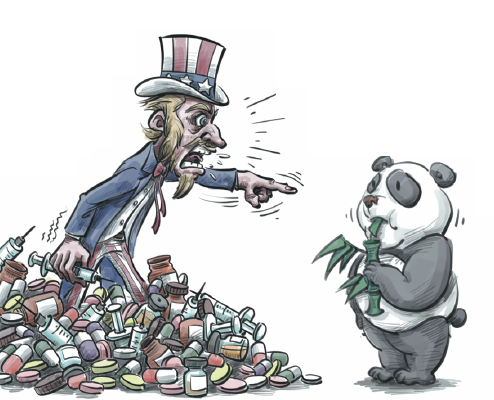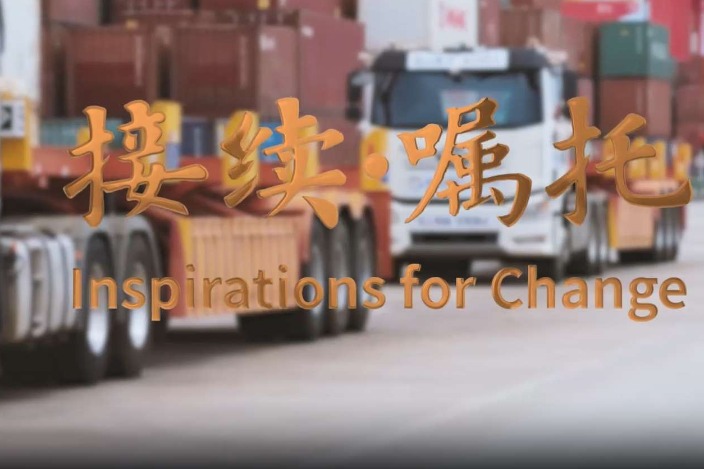US, not China, to blame for fentanyl crisis


Fentanyl is a highly synthetic opioid primarily prescribed by doctors as an analgesic or pain-reliever. But since the abuse of fentanyl can lead to drug addiction and even death, most countries have included it in their controlled substances' list. The easy availability of fentanyl in the United States, however, has led to a serious social crisis. In fact, the US is the world's largest producer and consumer of fentanyl-based drugs, and Americans, who account for 5 percent of the world's population, consume 80 percent of the opioids, including fentanyl, in the world.
Countries around the world have taken targeted measures to strictly control the sale and use of fentanyl and other opioids. Despite that, the abuse of fentanyl in the US has increased and caused more deaths.
Recent US administrations have either regarded fentanyl abuse as a "threat" to the US or made opioid control one of their top priorities. But the anti-drug policies introduced by the administrations have been aimed at treating the symptoms rather than removing the root cause of the problem. For example, as a country facing the most serious fentanyl problem in the world, the US has not implemented strict drug control laws or put all fentanyl-like substances under control.
In May 2023, the US Congress introduced a bill to combat the threat of fentanyl, which was intended to subject all fentanyl-related substances to control. Yet the bill failed to become an act due to political polarization. The Republicans and Democrats have used the drug problem, which has been destroying lives, as a "bargaining chip" in political games. Worse, some US pharmaceutical companies have exacerbated the opioid crisis in several states by downplaying the risks of using opioids as a painkiller, in order to increase their sales and make more profits.
On the other hand, China imposes strict control on the use of fentanyl and fentanyl-like substances, and supports other countries, including the US, in their fight against drugs.
China ratified the United Nations Convention against Illicit Traffic in Narcotic Drugs and Psychotropic Substances in September 1989. Since then, it has fulfilled all its obligations under the UN Drug Convention, strengthened legislation and strictly controlled the use and sale of chemicals. Under the convention's framework, China has cooperated with international organizations and other countries, including the US, in combating drug trafficking and abuse, to address the fentanyl crisis.
China and the US reached an agreement in December 2018 to strengthen cooperation in law enforcement and drug control, including the sale and use of fentanyl-related substances. In less than five months after that, that is, on May 1, 2019, China officially added all fentanyl-related substances to its list of controlled chemicals, which far exceeds the scope of 27 fentanyl-related substances under control under the UN Drug Convention.
The Chinese government has also drafted three legal documents, including one for prosecuting, trying in a court of law and sentencing those involved in fentanyl-related substance crimes. Also, it has established five sub-regional centers of the State Drug Laboratory across the country, strengthened the fentanyl-related substance testing and monitoring system, maintained data on enterprises manufacturing fentanyl-related substances, the number of people involved and the equipment used in the process, and monitored the overall production and sale of fentanyl and fentanyl-related substances.
In addition, the government has established a mechanism to scrutinize the import and export licenses of enterprises legally dealing in listed chemicals, ensure the products are dispatched and received by the entities mentioned in the export-import documents, and thoroughly check the parcels bound for the US. In accordance with the UN Drug Convention, it has cracked down on drug traffickers and abusers by investigating and intercepting drug supplies, so as to prevent controlled chemicals from flowing into narcotics processing channels.
And yet the US has imposed sanctions on Chinese companies and citizens on suspicion of manufacturing and selling fentanyl and fentanyl-related chemicals, while smearing China by claiming that it is a major producer of "precursor chemicals of fentanyl". Some US politicians have even alleged that "precursor chemicals from China flood North America and stifle international efforts" to combat the drug menace, and that "it is the Chinese chemicals for fentanyl that flow into Mexico and then into the US".
Instead of making China a scapegoat to divert domestic public opinion from the administration's failure to effectively address the fentanyl problem, the US should put its house in order, strengthen law enforcement and take targeted measures to contain the drug menace.
The author is the dean of the School of International Law at the China University of Political Science and Law.
The views don't necessarily reflect those of China Daily.
If you have a specific expertise, or would like to share your thought about our stories, then send us your writings at [email protected], and [email protected].
































